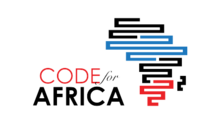Code for Africa is a non profit African network of digital democracy laboratories and data journalism, with its Secreteriats in Nairobi, Cape Town, Nigeria, and Tanzania. It has teams and partners in 21 African Countries, providing Citizens with actionable information to make informed decisions that enhances civic engagement for improved public governance and accountability.[1][2]
Code for Africa | |
 CfA Logo | |
| Pronunciation |
|
|---|---|
| Formation | 2012 |
| Founded at | Nairobi Kenya |
| Type | Nonprofit
NGO |
| Headquarters | Cape Town, South Africa
Nairobi, Kenya Abuja, Nigeria Lagos, Nigeria Kampala, Uganda |
Region | Burkina Faso, Burundi, Cameroon, Central African Republic, Côte d’Ivoire, Ethiopia, Ghana, Guinea, Kenya, Mali, Morocco, Niger, Nigeria, Senegal, Sierra Leone, South Africa, Sudan, Tanzania, Uganda Zimbabwe |
| Services | Data journalism, Fact-checking, Content development, Mooc development, Training and event coordination |
Official language | English, and French |
CEO | Justin Arenstein |
| Website | https://opportunities.codeforafrica.org/ |
Background
editCode for Africa was founded by Justin Arenstein in 2012 to develop resources to make data more accessible. Code for Africa creates projects and training to enable data journalism and make fact-checking and forensic data analysis tools accessible to journalists and citizens.[3] Code for Africa also organizes trainings for data journalism.[4][5]
In 2015, Code for Africa received $4.7m from the Bill & Melinda Gates Foundation to fund data projects in Kenya, Nigeria, South Africa and Tanzania on health and development journalism.[6]
In 2016, Code for Africa launched impactAFRICA Data Journalism Fund worth $500,000 with the International Center for Journalists, and funding from Bill & Melinda Gates Foundation, and the World Bank.[7]
In 2017, Google announced a training in collaboration with Code for Africa and World Bank for data journalism.[8] In 2019, the Nigeria's National Bureau of Statistics worked with Code for Africa in the publication of data as open data.[9] During the 2020 COVID-19 pandemic, Deutsche Welle partnered with Code for Africa to set up fact-checking in various Kenyan media houses through it PesaCheck initiative.[10]
See also
editReferences
edit- ^ Otte-Witte, Nina (2022-05-04). "Disinformation on the front lines: 'War is not just bombs and tanks'". Deutsche Welle. Retrieved 2023-03-01.
- ^ Flueckiger, Simon (2021-07-01). "Code for Africa: How the pan-African network is empowering citizens". BusinessLIVE. Retrieved 2023-03-01.
- ^ Hall, Hannah (2018-03-13). "Code for Africa". regional-insights.org. The Jefferson Institute. Retrieved 2023-03-01.
- ^ Ogundare, Funmi (2019-07-05). "RCDIJ: BudgIT, Code for Africa, Others Empower Journalists". This Day Live. Lagos, Nigeria. Retrieved 2023-03-01.
- ^ "PUNCH reporters join African counterparts in data journalism training". PUNCH Media Foundation. Lagos, Nigeria. Retrieved 2023-03-01.
- ^ Reid, Alastair (2015-08-13). "Code for Africa receives $4.7m to fund data projects | Media news". Journalism.co.uk, Mousetrap Media Ltd. Retrieved 2023-03-01.
- ^ "Code for Africa Launches impactAFRICA Data Journalism Fund". News Ghana. 2016-01-20. Retrieved 2023-03-01.
- ^ Oluwagbemi, Ayodele (2017-06-08). "Google announces free Digital Journalism program for 6,000 journalists in Africa". Punch Newspapers. Nigeria. Retrieved 2023-03-01.
- ^ Kumar, Ravi; Ottaviani, Jacopo (2023-02-24). "Data Blog | Boosting data literacy and increasing demand for data use in the Africa region". World Bank. Retrieved 2023-03-01.
- ^ Pahlke, Jennifer; Zimmer, Paul (2020-04-16). "Corona Crisis in Kenya: "Fact-checking can save lives!" | DW | 16.04.2020". DW Akademie | Deutsche Welle. Retrieved 2023-03-01.